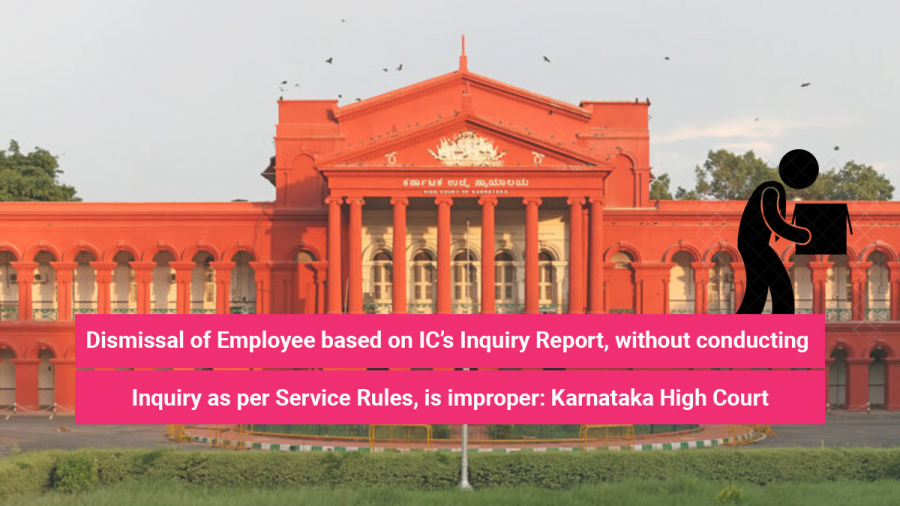On 20th July, 2021, in the case of Arabi U. Vs. The Registrar, Mangalore University, Mangalagangotri and Ors., the Karnataka High Court held that the decision to impose penalty of dismissal without inquiry as contemplated under the Service Rules is clearly an act without jurisdiction. Facts of the case are that Arabi U. (“Petitioner”) was chairman of dept. of economics in Mangalore University. A project student lodged a sexual harassment complaint before State commission for Woman and National Commission for Woman, which was communicated back to the University to take appropriate action.
This led to the complaint being converted into a complaint under Section 9 of the POSH Law. The Petitioner gave his reply to the complaint but not being satisfied with the reply, the University placed the complaint for its inquiry before the Internal Committee (“IC”). IC conducted the inquiry and held the Petitioner guilty of the allegations. In this context, the University proposed to impose major punishment of dismissal from service by giving 15 days clear suspension notice to the Petitioner. The Petitioner challenged this order by filing this writ petition before Karnataka High Court.
The question before the Court was whether the penalty of dismissal from service could have been proposed without following the procedure stipulated under the Service Rules?
The Petitioner argued by relying on Vijayakumaran C.P.V. v. Central University of Kerala (30-1-2018), that the proposal to dismiss the Petitioner from service was incorrect as such decision has been taken on the basis of a report of the IC without holding any inquiry under Service Rules. He said that the penalty of dismissal can be imposed only after following the procedure under the Service Rules.
The Respondents argued by relying on judgments in Vishaka and Ors. vs. State of Rajasthan (1997) and Ors. and Medha Kotwal Lele and Ors vs. UOI (2012) that the report of IC is sufficient to impose penalty against an employee who is accused and found guilty of sexual harassment.
The Court held that:
- According to Sections 11, 13(3) and 13(4) of the POSH Law, it is mandated that once there is a complaint before the IC, IC should proceed with inquiry as per Service Rules applicable to the employee (where Service Rules exist) in a manner as may be prescribed and in consonance with principle of natural justice.
- Referring to Vishaka and Ors. vs. State of Rajasthan and Ors. and Medha Kotwal Lele and Ors vs. Union of India and Ors. (which were relied on by Respondent), the Court stated that though Vishaka judgment directed that IC report will be an inquiry report, the judgment also states that directions in Vishaka will remain effective until legislative enactment on the subject. It said that Metha Kotwal Lele judgment also depicts that these directions would be valid till appropriate legislation is brought out. Once legislation steps in, the rigor of the guidelines or tenor of the guidelines in my would become inapplicable.
- Court further stated that where Service Rules exist, the report of IC becomes a fact-finding report or a preliminary report, with regard to the allegation of sexual harassment and the employer becomes duty bound to proceed under the Service Rules before imposing any major penalty.
- Referring to Service Rules applicable to Mangalore University, Court noted that since there were no separate disciplinary Rules for these allegations, ‘Statutes Governing Classification, Control and Appeal Rules of Employees of Mangalore University’ would be applicable and these Rules do not provide for any penalty against an employee except after following the procedure stipulated in such Rules. Therefore, the court held that the decision to impose penalty of dismissal was clearly an act without jurisdiction, as no inquiry as contemplated under the Service Rules was ever initiated against the Petitioner. Court directed that no penalty be imposed against the Petitioner basis IC’s report without holding an inquiry under the Service Rules.
Please note:
Rule 11 of Statutes Governing Classification, Control and Appeal Rules of Employees of Mangalore University states theProcedure for imposing major penalties as:
- No order imposing any of the major penalties specified in sub rule (iv)(b) to (viii) of rule 7 shall be made except after an inquiry held as far as may be, in the manner provided in this rule and rule 11-A.
Section 13(3) and (4) POSH Act states:
Where the Internal Committee or the Local Committee, as the case may be, arrives at the conclusion that the allegation against the Respondent has been proved, it shall recommend to the employer or the District Officer, as the case may be—
- to take action for sexual harassment as a misconduct in accordance with the provisions of the service rules applicable to the Respondent or where no such service rules have been made, in such manner as may be prescribed;
- to deduct, notwithstanding anything in the service rules applicable to the Respondent, from the salary or wages of the Respondent such sum as it may consider appropriate to be paid to the aggrieved woman or to her legal heirs, as it may determine, in accordance with the provisions of section 15:
Provide that in case the employer is unable to make such deduction from the salary of the Respondent due to his being absent from duty or cessation of employment it may direct to the Respondent to pay such sum to the aggrieved woman:
Provided further that in case the Respondent fails to pay the sum referred to in clause (ii), the Internal Committee or as, the case may be, the Local Committee may forward the order for recovery of the sum as an arrear of land revenue to the concerned District Officer.
(4) The employer or the District Officer shall act upon the recommendation within sixty days of its receipt by him.
 Cart is empty
Cart is empty



